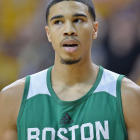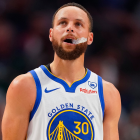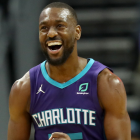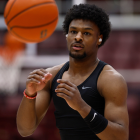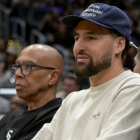Kyrie Irving is with the Boston Celtics and all it cost them was an All-Star, third-team All-NBA franchise point guard and emotional leader, a versatile two-way role player forward and the most valuable remaining draft pick in their stocked cupboard. But whatever the cost, the moves have been made and the Celtics are going to be entirely different. This team is Kyrie Irving's now, and it is not at all the team that reached the Eastern Conference finals last season.
So of course, here's the question ... are they better now than they were last season?
| Boston Celtics offseason player movement | ||||||||
OUT | IN | |||||||
Brooklyn Nets' 2017 No. 1 pick (Markelle Fultz) | Jayson Tatum (No. 3 pick in draft) | |||||||
Lakers' 2018 first-round pick (if 2-5 only) | ||||||||
Jae Crowder | Kyrie Irving | |||||||
Nets' 2018 first-round pick (unprotected) | Gordon Hayward | |||||||
Avery Bradley | ||||||||
Amir Johnson | Aron Baynes | |||||||
Jones Jerebko | ||||||||
Semi Ojeyele | ||||||||
That is a lot of talent out, a lot of talent in. The Celtics return just four players from last season's Eastern Conference finalist: Jaylen Brown, Marcus Smart, Terry Rozier and Al Horford. It's an incredible amount of turnover for a team with such success. Let's break this down into components.
Point guard
Thomas, with his hip injury that could keep him out for some unknown amount of time, is obviously not as valuable as Irving. Fully healthy, it's a wash in the moment. Long-term, Irving is much more valuable. That's part of what's fascinating about this deal. You can spin this deal as being future-focused ... but the Celtics also surrendered the Nets pick. You can spin it as being about the immediate future, but they're not ready to contend for a title yet.
Irving's fit with Boston is suspect relative to Thomas, but the big ethos behind that trade-off is about potential ceilings. The idea is that maximized with Brad Stevens, Irving could lift the Celtics to a higher level than Thomas could, over a longer period of time given Thomas' age. The best of Kyrie Irving is yet to come, the thinking goes, and that will be better than anything Thomas or the Nets pick could provide.
That's a gamble, on a lot of levels. All of this is a gamble for president of basketball operations Danny Ainge. If Irving doesn't fit in, if things don't go well and Irving leaves in free agency in 2019, if he doesn't adapt and frays with teammates (or worse, with Stevens, who has yet to have a player he didn't get along with outside of maybe Rajon Rondo) -- there's a whole array of ways this goes sideways, just from the prospect of building your team around Irving.
And they have built their team around Irving. You don't surrender as much as Boston did in this deal without giving him leverage and influence over the organization. Under Stevens, everything has been collective, a true team effort, the Celtics' whole was stronger than the sum of their parts. Now, they've built their team around Irving. He is not the same player he was when LeBron James arrived. He has grown and developed. But it's difficult to escape how troublesome a player Irving was. He was a defensive non-entity (and that hasn't changed). He had just finished his first season with more than 60 games played, and had suffered a regression in shooting efficiency. More than that, though, he had struggled as the franchise icon, blowing off fan appreciation nights and remaining aloof.
That's part of this equation, too. Isaiah Thomas was like a band's frontman. He was comfortable, eager even, to be the face of a franchise. Irving is more idiosyncratic, and not just in his views on the shape of the planet. If Thomas was U2's Bono, Irving is Pearl Jam's Eddie Vedder, perhaps a greater talent, but more shy to the spotlight despite his familiarity with it.
All of these things make the Celtics a fascinating storyline to watch play out. Their upside is sky high and the potential for disaster is equally high.
Role players
Amir Johnson, who has had a tremendous career, was barely playable in the playoffs last season. So he's no loss. But the Bradley-Crowder-Olynyk trifecta is an incredible loss. Boston retained its three best players in defensive win shares last season, but lost the three next best while adding Hayward.
Bradley next to Irving would have been an incredible backcourt, far better than Thomas-Bradley because Bradley wouldn't have to account for Irving's size constantly. Crowder's versatility and containment were impactful. Olynyk was surprisingly good the past two seasons after the Celtics implemented a scheme to provide containment with Olynyk instead of using him to hedge or blitz in pick-and-rolls, where he could be exploited.
Hayward is a star upgrade. No doubt there. But are Hayward and Marcus Morris better than the three they lost? That's a key question, and the answer is probably no, at least on the defensive end. Boston is counting on progression from Jaylen Brown and Marcus Smart to make up for that, and those are reasonable gambles. Even if their overall knowledge base defensively falls off, those two are high-motor, aggressive defenders, and that mitigates the mistakes they'll make.
The Celtics are relying on a lot more inexperience now. Al Horford is a rock, Hayward is an All-Star and Irving is an explosive, dynamic superstar, at least in the fame sense. But Smart's game is still incomplete, Brown is still painfully young, Jayson Tatum doesn't project as being versatile so much as an efficient weapon and the other kiddos' roles and abilities are unknown. Like it is with the entirety of this offseason, there's a huge amount of variance to go with the upside in their decisions.
Picks
Most of this is unknowable. Weird things happen all the time with the lottery, and not just the actual ping pong balls but the bizarre nature of the season. The Sixers tried harder than maybe any team in NBA history to tank in 2014 and the Milwaukee Bucks still landed the best odds in the lottery, only to watch Cleveland jump them.
The Nets pick that Boston transferred instantly suffered a narrative edit from Beantown. Before, the talk was "look at how stacked the Celtics are, with a good team and picks!" Upon dealing it, you started to hear word from those connected to the team, "Well, the Nets pick might not even be that good this year."
Spoiler alert: The Nets pick is still going to be pretty good.
The worst-case scenario for Cleveland is that the Cavaliers get a pick somewhere between six and 10 next June, giving them a good role player but not a star in the event that James leaves. However, wouldn't a pick of that range be perfect for Boston? To add to their core, especially given their lack of frontcourt depth? The worst-case scenario for the Celtics, meanwhile, is that the Nets are still bad, or at least bad enough to give themselves a top-three odds placement, which seems likely if not certain, and they wind up with one of either Michael Porter Jr. or Marvin Bagley III.
Meanwhile, the Celtics can rationalize that loss with the acquisition of Tatum, who they supposedly/reportedly wanted No.1, and the Lakers pick. It should be noted, though, that the Lakers pick is protected for all but just four spots in the lottery: two through five. So if the Lakers wind up with the fourth-worst record in the NBA and two teams (miraculously) jump them in the lottery, the Sixers keep that pick. The pick then transfers to the 2019 unprotected Kings pick Philly owns.
Two years from now, will the Kings be a laughingstock? Well, we've thought they had to pull themselves out at some point over the past 12 years and it hasn't happened. The Kings have had a top-five pick three times since 1991. There's a good chance it's still a good pick, but it wouldn't surprise anyone if Sacramento pulled itself into the 8-12 range by then, either. But then, it could also hit in the lottery as well.
One thing you cannot say: The Celtics are not as set for the future as they once were. They are likely not getting a superstar, but they believe they have the stars they need, and Tatum and Brown could develop.
Chemistry
This is where all that turnover gets tough. They lost their emotional leader in Thomas, they lost long-time grinder guys in Crowder and Bradley. They brought in Irving as their leader, which we talked about above, and Gordon Hayward, who isn't a dominant personality but is generally known as a "good dude," same as Horford (also not an outspoken leader). Smart might take over as the dominant personality. That will have benefits and challenges. Brown has shown a brashness that could lead to that role for him as well, but those are both young guys.
More than anything, there's a disruption in continuity, and that usually leads to challenges. It takes time for teams to come together with this many new parts. So they might take a step backward next season, even with (arguably) better talent. Going forward, it will depend on if they can mesh.
So are they better?
The short answer is that they could be. Do you care about what the best-case scenario is, or the most likely range of outcomes? The ceiling for the Celtics, with Irving as a transcendent, play-making supernova scorer next to Hayward as his perfect complement and the young guys all becoming the most they can be, is higher than the overachieving try-hards they were last season. Boston won 53 games in 2016-17, four games above where metrics indicate they should have finished. Their moves this summer show that the front office wasn't convinced this was sustainable, and made moves toward what it thought was a brighter future.
But there's so much more risk involved. If Irving isn't the guy they believe he is unless he's next to James, if the picks don't work out just right, if Tatum and Brown never become special, if Horford tails off with age and injury, if the chemistry isn't the same, all of these things are bigger risks than a model with a lower ceiling they could have tweaked and improved upon. You cannot help but wonder about the other stars moved this summer, for so much less than Boston gave up, and whether that team, with Thomas -- even with the injury -- next to Hayward and either Paul George or Jimmy Butler, or maybe DeMarcus Cousins down the line, would have been better.
Then again, the war chest remains at least half-full, and there's always the dream of Anthony Davis. The Celtics' "win now, dream about later" approach never really ends.









